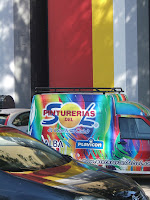 |
| alabaster window |
It's orientation week, for students and visiting faculty alike. I want to say disorientation as well (notice my self-restraint--no parenthesis around the prefix, though both training and inclination leave me tempted to ask a word to be its opposite even as it is defined, greedily hoping to hold ambivalence and precision in the same little bundle of sound). But orientation, whenever someone takes the trouble to offer it, inevitably seems disorienting as well.
 |
| Recoleta Cemetery (from the--open--stone window) |
 |
| Librería Ateneo Gran Splendid (Buenos Aires) |
Before catching the bus to Rosario, I spent a couple of days beginning to find my way around Buenos Aires. At the Claustros del Pilar, an old section of the church beside the Recoleta Cemetery, I especially admired the stone windows, thin, translucent sheets of alabaster. There is something about the idea of a stone window that intrigues me (though I suppose glass, with its origins in sand, is only a more refined stone). Maybe it has to do with direction and enclosure: these windows are translucent, not transparent; they let light in, but you can't see out.
I attended the theater-- the theater of live performance, and the theater of books.
 |
| Rosario |
I'm living in an eleventh-floor apartment downtown--not what I'm used to at all. My Buenos Aires hotel room, with its sought-after view of the air shaft, was much quieter. But I like the view from the enclosed balcony, and the cafés up and down the street, and the elevator with its complicated, manually-operated double doors.
 |
| Río Paraná |
Rosario is a river city, with the Paraná, running roughly north to south, marking the eastern border. I walked to the shore yesterday and again today, noting the "No Fishing" signs next to the numerous fishermen (I don't know what they were hoping to catch) and watching a couple of ships pass. The water is brown; the current looks fast. I met a professor the other night who's training to swim across the river--it's an annual event. From the riverbank, it's a daunting proposition. I'll stick to running for now.
 The contemporary art museum occupies a reconditioned grain silo. The driver of the paint truck parked beside it was likely just having a late breakfast at the museum café, but the truck seemed well-placed all the same.
The contemporary art museum occupies a reconditioned grain silo. The driver of the paint truck parked beside it was likely just having a late breakfast at the museum café, but the truck seemed well-placed all the same.All the benches on Blvd. Oroño are held up by paired sphinx. They look recently painted, for the most part, well-tended. I'm trying to imagine the civic boosters meeting where such a design plan was proposed and endorsed. Many of the benches seem to be work stations for the itinerant car-washers tending to the late-model vehicles parked nearby. No riddles, just small change.
Orientation can be a series of rules and expectations and procedures, neatly outlined and carefully explained. It's is also a spatial concept, one that implies attention to both context and perspective: what we see and from what vantage point. Sometimes there's not a lot to see. Sometimes it's a matter of waiting for light to penetrate stone.




Reading your post was the ideal way to start my day. I love having the chance to accompany you on this adventure. And now this morning I am magically in two worlds at once: summer to fall in Eugene and winter to spring in Rosario. So much light coming through those stone windows. Thank you.
ReplyDeleteReally lovely, Amalia! Stone windows, sphinx benches ... it's as if you've stepped into an imaginary world. At least, that's how you're conveying it to us. Wonderful.
ReplyDeleteNot an imaginary world, but there's enough I don't know that I can't help but make things up. Maybe that's just the writer's reflex?
ReplyDeleteI'm glad your local fall and vicarious spring are both well-lit, Karen! I am going to be thinking about stone windows for a while.
This comment has been removed by the author.
ReplyDeleteRosario seems a place where poetry is still possible: benches with sphinx, stone windows... I want to go there!
ReplyDeleteI hope you can, Irina! It's an intriguing place. But I think poetry is always possible. Even in unexpected or unprepossessing places.
ReplyDelete